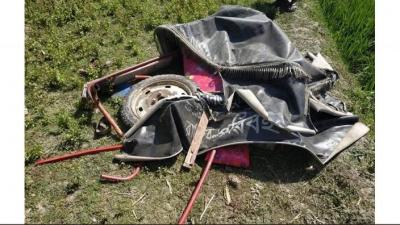 With more and more cows becoming affected by a recent outbreak of lumpy skin disease (LSD), cattle farmers in Bhola are becoming increasingly worried for their cattle.
With more and more cows becoming affected by a recent outbreak of lumpy skin disease (LSD), cattle farmers in Bhola are becoming increasingly worried for their cattle.
According to the Department of Livestock Services (DLS), there were a total of 595,020 cows in the district as of August this year and the Livestock Research Institute has already been instructed to supply vaccines among local farmers to promptly counter the viral disease.
Although the number of cows infected was not determined, cattle farmers Md Shahabuddin of Char Shamaia village in Sadar upazila and Khalil Miya of Char Fesson upazila said thousands of cows are likely infected with LSD in the district.
Md Shahabuddin, who rears 14 cows in his farm, said: "All my cows have been infected. Some of my cows are bought with loaned money, if the cows die, I won’t be able to pay back my loans."
Khalil Miya has four infected cows among the 20 he owns. "I have heard that the disease is spreading rapidly. Milk from my cattle farm has little demand to those who are aware of the condition of some of my cows."
However, District DLS Officer Dr Indrajit Kumar Mondal said: "We have treated around 301 infected cows till November 15. Initially, nodules develop on the skin of the infected and then the cow suffers from fever and loses its appetite.
"The condition of the affected might severely worsen, if not cared for within a couple of days. The front pair of legs may swell and the lumps might burst, leaving the animal with infected wounds that sometimes bleed.
"The virus is borne by mosquitoes and flies. Transfer of saliva and semen from the infected to a healthy cow can also result in the spread of the disease. Milk production may decrease for the affected cow, but the milk does not contain any harmful particle and is safe to drink."
“Once fully recovered, a cow becomes immune to LSD, and most cows do not need costly treatment. We will vaccinate the cows once the vaccine is ready."
Dr Indrajit recommended Paracetamol for fever and mosquito nets for the infected animals after secluding them. "Feeding rice starch will help the ailing cows that lost appetite and need liquid food to recover."
The livestock officer could not confirm if any cow had died due to the disease in the district so far. In some cases the cows might stop eating and drinking altogether, because of the infections inside the mouth and stomach, he added.
 Country
Country
41267 hour(s) 43 minute(s) ago ;
Morning 06:37 ; Wednesday ; Jul 02, 2025
Lumpy skin disease worries cattle farmers
Send
Ahad Chowdhury Tuhin, Bhola
Published : 02:00, Nov 27, 2019 | Updated : 02:00, Nov 27, 2019
Published : 02:00, Nov 27, 2019 | Updated : 02:00, Nov 27, 2019
0 ...0 ...
/zmi/
Topics: Top StoriesExclusive
- KOICA donates medical supplies to BSMMU
- 5 more flights to take back British nationals to London
- Covid19: Rajarbagh, Mohammadpur worst affected
- Momen joins UN solidarity song over COVID-19 combat
- Covid-19: OIC to hold special meeting
- WFP begins food distribution in Cox’s Bazar
- WFP begins food distribution in Cox’s Bazar
- 290 return home to Australia
- Third charter flight for US citizens to return home
- Dhaka proposes to postpone D8 Summit
Unauthorized use of news, image, information, etc published by Bangla Tribune is punishable by copyright law. Appropriate legal steps will be taken by the management against any person or body that infringes those laws.
Bangla Tribune is one of the most revered online newspapers in Bangladesh, due to its reputation of neutral coverage and incisive analysis.
F R Tower, 8/C Panthapath, Shukrabad, Dhaka-1207 | Phone: 58151324; 58151326, Fax: 58151329 | Mob: 01730794527, 01730794528






